Presume Nothing
I look at gender politics in original versions of “Presumed Innocent” (book and movie) and “Fatal Attraction” alongside currently streaming remake of “Presumed Innocent” (no finale spoilers!)
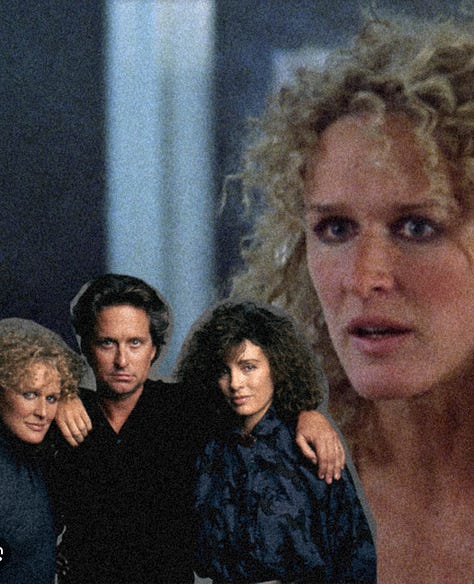
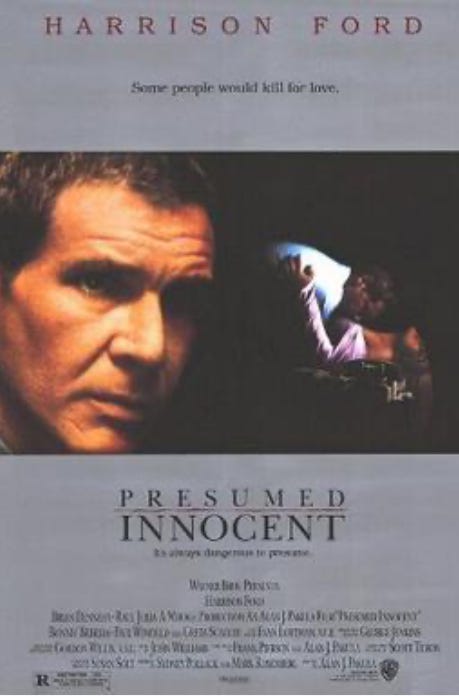
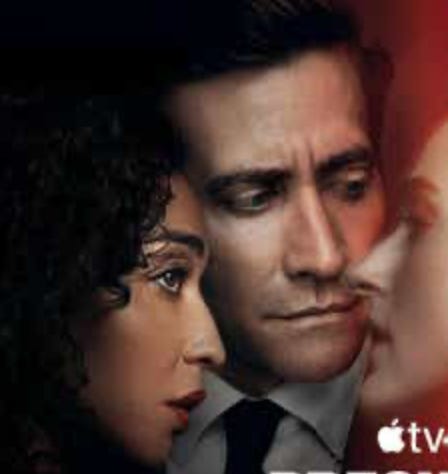
I’ve read the novel and I’ve seen the 1990 movie—numerous times. But I have no idea how the series remake of Presumed Innocent is going to end. It’s hard to remake an iconic thriller—particularly if its twists and gender resonances were so of its own particular time. The 2023 series of Fatal Attraction not only didn’t boil the bunny but invented a whole new character to kill off Alex Forrest. And that’s only the tip of the iceberg of the differences from the 1987 movie. In the 2023 series, the child Ellen who quivered and tearfully stroked her stuffed toy in the movie (director Adrian Lyne, never interested in the ethics of his “art,” got the realism by actually upsetting the little girl) is all grown up and studying Jungian psychology. Her dad (“I won’t be ignored”) Dan has (unjustly) served 15 years in prison. Long-suffering wife Beth is revisioned as a non-dishrag and has remarried. And Alex is given the history and psychologically deeper dive that feminist critics (including Glen Close, who played her in the movie) had wanted for her. Whether you love the changes or miss the archetypal formula and characters of the original (which isn’t really the original—but more about that later), the series does manage to keep an audience that’s very likely to have seen (or at least read about) the movie uncertain about who done it until the very end.
The Presumed Innocent series has stayed much closer than Fatal Attraction to the main narrative lines of Scott Turow’s 1987 book and Alan J. Pakula’s 1990 movie—cocky lawyer has a steamy affair with a sexy and brilliant colleague; then becomes the chief suspect when she’s murdered in a grisly fashion—but still throws enough reasonable doubt around so that even those who know the movie by heart can’t really be sure what’s going to happen in this week’s finale. And, as I’ve been surprised to discover (what’s how old I am) an awful lot of viewers actually haven’t seen the 1990 version. I’m not going to skew their guesses with information about the ending of the movie—or the book, which I first read when my therapist recommended it to me as a diversion from my anxiety (it was—a little) and then read again in preparing to write this stack. So relax about that.
The second time around with the book, I was startled by the “literariness” of it (I’d forgotten or never knew that Scott Turow started out as a literature prof) and by how much of a fancy meditation on masculine love and obsession it is (many, many passages—some very good and some very turgid—in which Rusty explores his passion for Carolyn.) Although I barely noticed it in 1987–that’s how conventional it was, especially for the genre—in 2024 the book’s casual sexism and nasty portrait of the professional woman seem like a caricature—just another variation on a familiar archetype (freshly familiar to me, after writing a book on representations of Anne Boleyn): the seductress who uses her sexuality in the service of ambition.
When I was young I frequently met women of Carolyn's type, women who used their sensuality with what we might call an aggressive twist. In this day and age, there is something more troubling about a woman with such an old-fashioned and oblique approach to the avenues of power. It seems more sinister. But she was very skillful…
…As I worked around Carolyn, with her jangling jewelry and her light perfume, her silk blouses, her red lipstick and painted nails, that large heaving bosom and her long legs, that splash of bright hair, I became overwhelmed by her—and in just that fashion, detail by detail, so that I would become excited when I smelled her scent on another woman who passed me in the hall…
…When we’re interviewing witnesses, I turn and Carolyn is staring at me, watching with this placid, almost rueful smile, as I do my stuff—or in a meeting with Raymond, all the top felony people, I’ll glance up, I’ll feel the weight of her eyes on me, and she continues watching me in such an unwavering fashion that I do something, a wink, a smile, as a form of acknowledgment, and she responds, usually that little cat’s grin, and if I’m speaking I stop, everything washes out of my mind, it is just Carolyn, things are unraveling right from the center of the skein.
“It’s going to be so good,” Carolyn (Greta Scacchi) purrs in the movie after they win a big case, and they have shove-the-stuff-off-the-table-and-lift-her-up-there sex in her office. (Not caring if you’ll be hammered by the edge of a desk is a Hollywood trope for unbridled lust.) For a while, it seems as though the passion (if not the obsessive nature of it) is mutual. But Carolyn is a succubus in shoulder pads, and when she finds out that Rusty (Harrison Ford) is unwilling to service her plans to move up the ladder, she dumps him. The scene is reproduced, virtually word-for-word from the book, in the movie. They are in bed, eating take-out food, when she presents a “suggestion”:
C: A lot of people think Raymond shouldn't run again. If he agrees to step aside, the party will let him decide who will take his place. They know he won't hand it all to Nico.
R: That's for sure.
C: Who would he choose?
R: Somebody from the office.Carry on his traditions.
C: You?
R: Mac, maybe.
C: She'd make a great candidate, in that wheelchair. That chair is not very telegenic. I think he'd pick you.You're the natural. Rusty...if you let him know you
want it, it'll be you.
R: I should just tell Raymond his time is up?
C: You could be tactful.
R: No.
C: Why not?
R: I'm not going to bite that hand. If Raymond wants out, that's up to him.
He's still the best candidate around, against Della Guardia.C: Without Raymond, Nico doesn't have an issue. Pull the party's people and Raymond's people together behind somebody else...that person would walk into the PA's office. It wouldn't be close.
R:You've thought a lot about this.
C:He just needs a push.
R: Push him yourself. It's not in me.
C: What?
R: Were you all set on being chief deputy?
At that point, Carolyn gets up, puts her clothes on, leaves and it’s over—for her. When he pursues her, she tells Rusty to “grow up.”
In 2024, the 1987/Scott Turow version of Carolyn seems like a relic. Occasionally—as in “Obsessed”—she gets a racial or ethnic make-over. But mostly, the conniving temptress now exists in Lifetime movies, historical and fantasy dramas, and cartoons. So, the Carolyn Polhemus of the current series (Renate Reinsve) wears virtually no make-up or jewelry—not even updated for 2024. She looks like she belongs more in an L.L.Bean catalogue than a Chanel #5 (or Viagra) ad. She breaks it off with Rusty (Jake Gyllenhaal), not because he thwarts her ambitions, but because they’ve gotten too close to “the falling-in-love part” and “I just don’t want anyone to get hurt.”
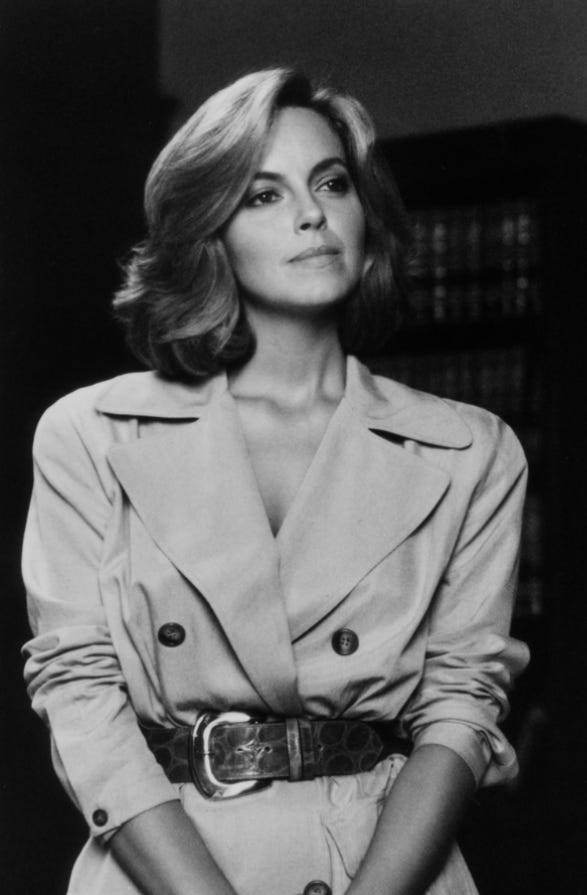
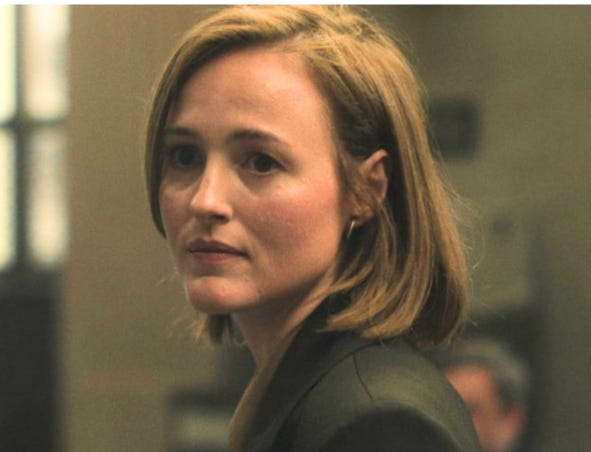
But back to 1987.
I applied for early tenure that year at the small Jesuit college where I had my first full-time teaching job. I had a spiky haircut and had just published a feminist deconstruction of Descartes. I was 40, and it was probably the sexiest-looking period of my life. And I had the professional chops to put myself up for early promotion. The Dean hated me so much that I kept a folder of receipts, in case his hostility won the day at the meeting. And temporarily, it did. Among the reasons given for denying me promotion (later reversed) were my provocative fashion choices. I wish I still had a photo of the worst offender—a grey skirt with a tattered hem. No skin exposed, just faux-ripped in the style made popular by Adrian Lyne’s “Flashdance,” in which Jennifer Beals plays a macho welder-by-day and sexy bar dancer by night who has dreams of becoming a professional dancer. I doubt the Dean saw the movie, it was just that ragged hem, which matched my spiky hairdo and feminist chutzpah, that offended him.
1987 was also the year of Adrian Lyne’s Fatal Attraction, whose original ending (by writer James Dearden) was changed at enormous expense when preview audiences felt that having Alex Forrest commit suicide was not enough punishment for the bunny-boiler. “Kill the bitch!” Male viewers shouted when a homicidal Alex breaks into the sacred space of the family home. And so that’s what the new version did, with the added satisfaction of giving every man’s dream of a wife (Ann Archer, looking both angelic and sexy) the task of taking down the crazed interloper.
Alex Forest hadn’t originally been meant (by Dearden or producer Sherry Lansing) to be so unsympathetic that audiences would shout for her murder. In fact, in Dearden’s short film “Diversion”—which became the basis for “Fatal Attraction”—it’s the husband who pays the price for his callously casual one-night stand (which he initiates) and that’s how Lansing (and Glen Close, who played Alex and fought against the demonization of the character) imagined the longer film. “I wanted the audience to feel great empathy for the woman,” Lansing wrote in her autobiography. But the men involved in making the film didn’t like the fact that empathy for Alex came at the expense of condemnation of the husband:
With each rewrite, Dearden was pressured to alter the characters further; the husband became progressively more lovable, the single woman more venomous. Dearden finally did away with the man’s little black address book and made the single career woman the initiator of the affair. “As we went along, Alex became much more extreme,” Dearden says. “She ended up having a kind of predatory quality. It weakened her case and strengthened his.” “The intent was to soften the man,” a studio executive who was involved in the development discussions explains….[But] Apparently no one had to feel for the single woman. (Susan Faludi, Backlash: The Undeclared War Against American Women)
The wife was an entirely different story:
Producer Stanley Jaffe says, "I wanted her to be-and I think this is the way she turned out—a woman who is sensitive, loyal, and acts in a way that I would be proud to say, 'I would like to know that lady'" Casting agent Risa Bramon recalls that she was told to find an actress who "projected incredible warmth and love and strength in keeping the family together." Meanwhile, Dearden was sent back to his desk to turn the two women into polar opposites— as he puts it, "the Dark Woman and the Light Woman." Originally the wife, Beth, had a job as a teacher that she was anxious to resume. But by the final version, all traces of a career were excised and Beth transformed into the complete Victorian hearth angel (à la the prototypical Victorian "Beth" of Little Women), sipping tea, caressing piano keys, and applying cosmetics with an almost spiritual ardor. (Backlash)
Director Adrian Lyne and Michael Douglas, who played Dan, enthusiastically agreed:
In Lyne’s analysis, the most unfeminine women are the ones clamoring for equal rights: “You hear feminists talk, and the last ten, twenty years you hear women talking about fucking men rather than being fucked, to be crass about it. It’s kind of unattractive, however liberated and emancipated it is. It kind of fights the whole wife role, the whole childbearing role. Sure you got your career and your success, but you are not fulfilled as a woman.” For his ideal of the “feminine” woman, he points to his wife: “My wife has never worked. She’s the least ambitious person I’ve ever met. She’s a terrific wife. She hasn’t the slightest interest in doing a career. She kind of lives this with me, and it’s a terrific feeling. I come home and she’s there. Michael Douglas harbored similar ill will for feminism and its effects. He told a reporter: “If you want to know, I’m really tired of feminists, sick of them. They’ve really dug themselves into their own grave. Any man would be a fool who didn’t agree with equal rights and pay but some women, now, juggling with career, lover, children [childbirth], wifehood, have spread themselves too thin and are very unhappy. It’s time they looked at themselves and stopped attacking men. Guys are going through a terrible crisis right now because of women’s unreasonable demands.” (Backlash)
Ah, the 80’s, when women were made to pay for the progress made by feminism. “Infertility Epidemic!” “Career burnout!” “College educated single women more likely to be killed by a terrorist than find a husband!” And cautionary case studies of “Real Life Fatal Attractions.” Better find your own Dan and get pregnant while you still can or risk turning into a psychopathic stalker.
Neither the 1987 book or the 1990 movie of “Presumed Innocent” go as far as Lyne’s “Fatal Attraction” in idealizing the betrayed yet devoted wife. In the movie, Barbara Sabich (Bonnie Bedilia) is depressed and bitter for about half the movie, then, after Rusty is arrested and tried, becomes transformed into a steadfast partner. The same character, in the novel, is a former math teacher who gave up her job after her son Nat was born. And even before her husband’s affair, she’s not a happy person:
“Not long ago it occurred to me that my wife, with her abrupt social mannerisms, her general aversion to most human beings, her dark taciturn side, and her virtual armory of private and largely uncommunicated passions, could be described only as weird. She has virtually no serious friendships aside from her relationship with her mother, to whom, when I met her, Barbara barely spoke, and whom she still regards with cynicism and suspicion. Like my own mother, when she was alive, Barbara seems largely a willing captive within the walls of her own home, flawlessly keeping our house, tending our child, and toiling endlessly with her formulae and computer algorithms.” (Presumed Innocent by Scott Turow)
And in David Kelley’s 2024 series that we’re now watching?
As Barbara, Ruth Negga is gorgeous, wears cozy sweaters, and says “not at the dinner table” (something I never heard my mother say, and I never say myself) when certain topics come up. She’s also absurdly tolerant of a husband who—forget the affair, I’m just talking about his personality—is so arrogant he thinks he can be his own lawyer (while on Ritalin!) and has the gall to throw a major hissy-fit when his wife tells him she kissed (kissed!!) another man. When he tells her that the affair with Carolyn didn’t end a year ago, as she’d thought, but started up again shortly before her murder (and left her pregnant) she just looks crestfallen.
I don’t know what Kelley (creator of “Ally McBeal,” “The Practice,” “Big Little Lies” and other series) was thinking about when he imagined this Barbara. Remembering (I guess) that it’s 2024, he’s given her a job (which she’s fired from after the scandal erupts,) an almost-lover, and a speech in which she declares that she’s “not tragically dependent” on Rusty. But she sure seems tragically something. She says, in the same speech, that she stays with him because she’ll “do anything to save” their family. But does that require being so constantly solicitous of him? (“You okay?”she asks, and tenderly kisses his head after they hear of Carolyn’s murder.) She seems even more beaten-down than Bonnie Bedelia’s Barbara. Bedelia’s Barbara, at least, could throw a sharp verbal punch:
B: You're in charge of this investigation?
R: Raymond insisted I take it on.
B: With 50 lawyers, they couldn't find one who didn't fuck her to put in charge?…You are so predictable. It's your way of reliving the whole thing. She's dead and you're still obsessing.
Here’s how the comparable scene is handled in the series:
B: Please don’t tell me you’re personally handling Carolyn’s case.
Rusty?
R: Raymond asked me to.
B: Raymond asked you to. [sighs]
R:If I don’t take it, then it falls to Tommy Molto, who will do nothing because this going unsolved dooms Raymond’s chances of reelection. I mean, should Della Guardia win, then he’ll give Tommy my job, by the way.
B: And what if it gets out…[stammers] That you two were involved. Imean, what’s that gonna do to your case, your career and our kids? Me?
R: It has been over for so long between me and Carolyn.I just need two weeks, because between now and the primary, Raymond needs there to be a case, Barbara. And I am the only one in the position to deliver that.
B: [inhales deeply] What, he can’t find a prosecutor who hasn’t slept with her?
R: I’m sorry.
He leaves the room and she follows.
B: Our marriage barely survived this. I barely survived this.I know you, Rusty.[sighs] You will disappear into this case.[sighs] You will disappear and you will go silent.
And that’ll break me.
The change from “fuck” to “slept with” may say it all. Bedelia’s Barbara is bitter and angry, and she has every right to be. But in the 2024 remake, Barbara is mournful, a cavern of sighs, beseeching. She barely manages a meager poke, and when he leaves the room (what, she doesn’t deserve a little more than “sorry?”) she follows like a puppy. And “that’ll break me”? I thought you weren’t tragically dependent. And why in hell doesn’t she have sex with the hot bartender?
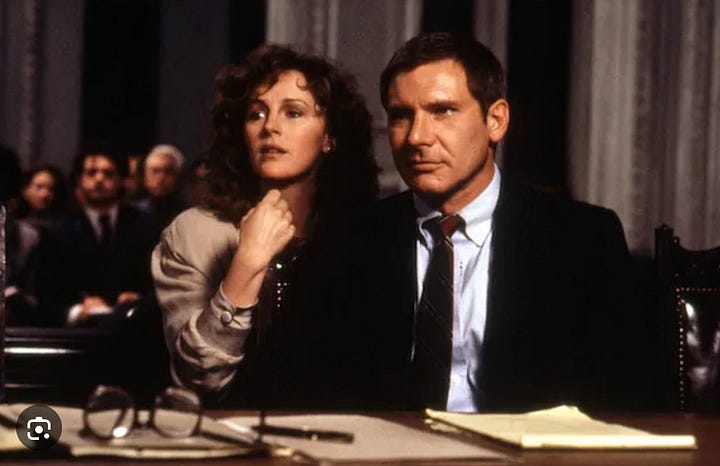
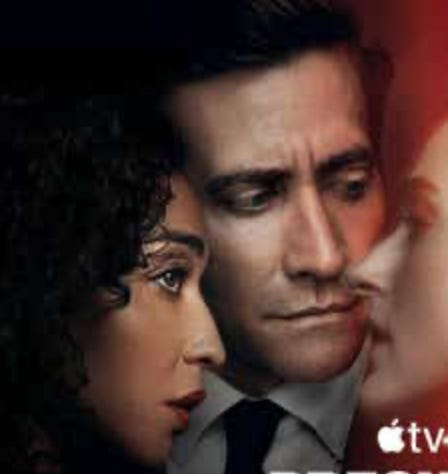
I kind of feel bad dumping on Barbara. But I’m honestly confused by the character, who seems like a throw-back to Anne Archer’s Beth in the 1987 “Fatal Attraction.” On the other hand, who wouldn’t be beaten down married to Rusty? One woman who wouldn’t—who’d never marry him in the first place, I suspect— is fellow lawyer Mya (Gabby Beans) who calls him out after he’s opened the door to being put in the witness chair. She’s appalled that he let that happen, but he thinks it’s just “fine”:
R: Fine. Let’s have Molto’s narcissism on full display.
M: And yours won’t?
R: What is that supposed to mean?
M: Did you… Did you do it on purpose?
R: [breathes shakily] What?
M: Open the door.
R: What do you think…?
M: You introduced testimony. Did you do it on purpose?
R: [stammers] Why would I do that?
M: ‘Cause you’re Rusty Sabich, and you can do whatever you want, right?
R: Mya, maybe… just maybe…I did it because I know what the fuck I’m doing.
M: [Scoffs] I don’t think so.
I’m done.
I wouldn’t have thought it possible that I’d ever find Jake Gyllenhaal unappealing. But about half-way through the episodes I realized the only times I liked looking at him in this series were when his clothes were off and his great body would get my attention rather than a face that suddenly seemed so sharp, impenetrable, reptilian. Apparently, they tried to make Harrison Ford more like that by giving him a weird Julius Caesar haircut. But there’s something warm and cuddly about Ford that can’t be altered. Jake, on the other hand, can do stiff and cold and arrogant. He does them really well in this series. And one way of looking at this version of Rusty is as an answer to all those male characters who, like Dan in Fatal Attraction, were protected from seeming unlikable—often at the expense of the female characters.
There’s a lot more to say about the series. But I’m going to turn it over to all of you now for your thoughts. I’ll get back to you after the finale!!


Susan, as always, I love the way you dig in, and I really appreciate your nod to Susan Faludi’s *Backlash* - I’m skipping the current remake of “Presumed Innocent,” and you’ve reinforced my gut feeling that it would do nothing to rehabilitate the sexy, man-eating Carolyn of the book. At least that Carolyn *was* sexy, even if Rusty was an agonized, sexist fool - and seeing it unfold from his POV in the written narrative makes clear his take on her is limited. He’s the unreliable narrator supreme.
I remember really liking Turow’s novel at the time it came out and being wowed by the quality of writing in a legal thriller. In many ways, Turow fueled that whole genre and seeded many a procedural TV show about the law, cops, and murky politics. I’m sure some of the book doesn’t hold up now, but the machinations of Cook County and scruffy city politics hooked me and continued to hook me in later books by Turow (in some of which Sandy Stern, one of his best characters, figured strongly - if he’s been cut from the new series, that’s yet another bone-headed decision).
It would be great if Carolyn Polhemus could be portrayed as you do Anne Boleyn: smart, sexy, vital, strategic etc. rather than as an overly ambitious, craven witch. How do we determine who gets to be ambitious, anyway, or who plays the political game? That’s only sort of a rhetorical question. Here’s the remake of *Presumed Innocent*, both book and film, I’d like to see: alternating chapters (scenes) from Carolyn and Rusty’s POV, with no 2024 airbrushing away of racial and gender dynamics. That might take us into far deeper waters regarding ambition, selfishness, passion, and a longing to be the good person everyone expects you to be.
The series has been very strange, and your analysis has helped me think about it. thanks. I just want Rusty to be found guilty even if he didn’t do the murder because he’s an insufferable prick. Barbara and the kids’ roles are so inconsistent, with no connective tissue to explain the swings for/against Rusty. It’s like 90% of the creative effort went into writing Rusty’s character and all of the other actors are meant to do what they can with mere sketches that change as the plot needs them to. They have serious acting talent in the series, but still it’s a hot mess.
Your recap of the late 1980s brought back vivid memories of women’s roles professionally and in the culture. Susan Faludi’s Backlash was so important to me when it came out. Until I read it, I’d been mystified why supposedly liberal men were blind to their own artistic and cultural misogyny. I’d been thinking something was wrong with me, when I wasn’t paid the same as a man doing my job (and the boss was a woman). That book helped me come to grips with how progress works.
So, a project to bring Turow’s book into the 21st century has to be fraught. They made a stylish series with beautiful actors but the premise is flawed. It all starts with the victim and she’s unknowable, because Rusty never bothered to understand her as a person, rather than as desire. I can’t imagine how they can tie it up satisfactorily in the remaining episode.